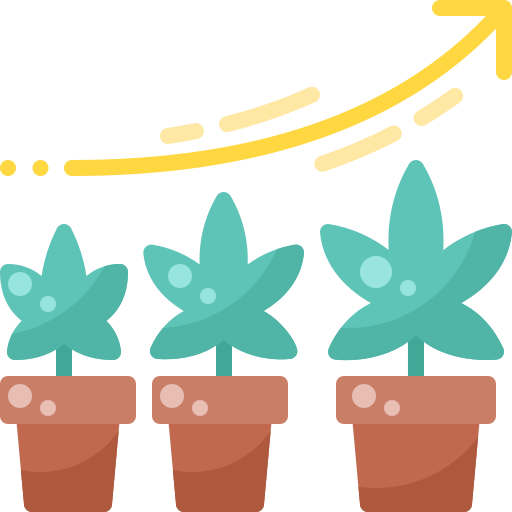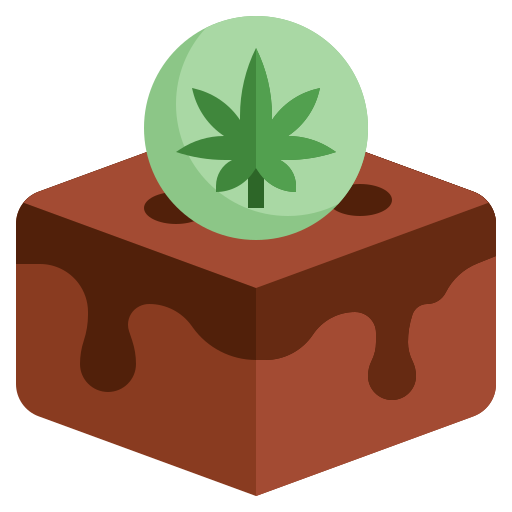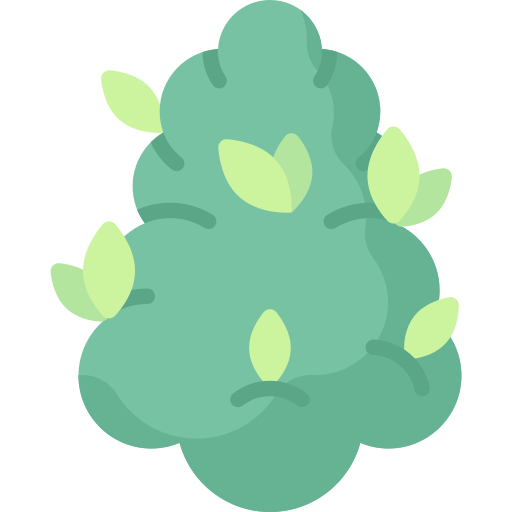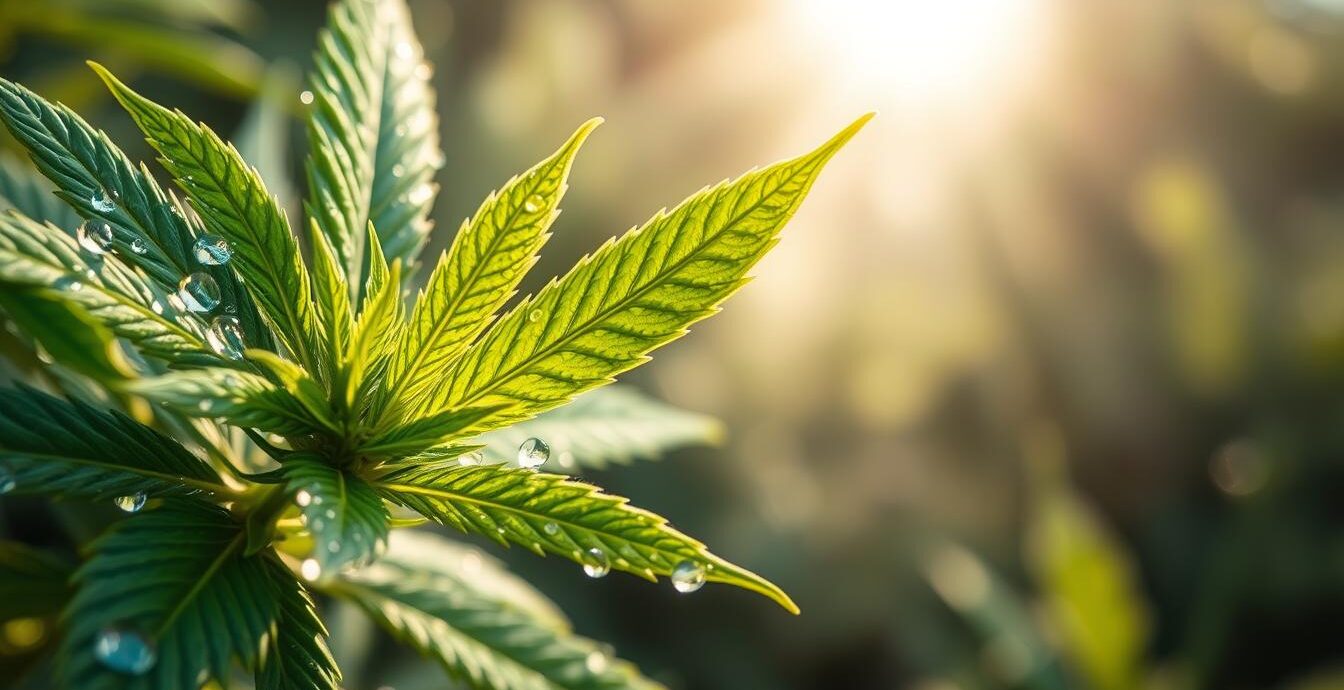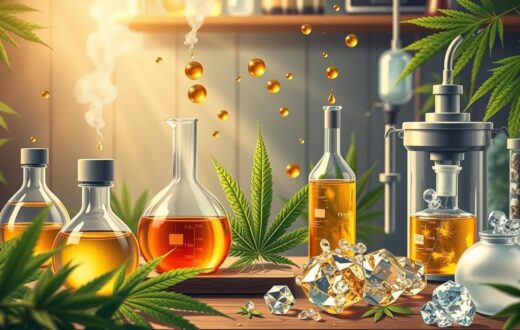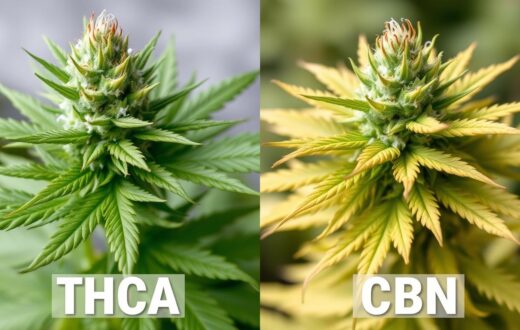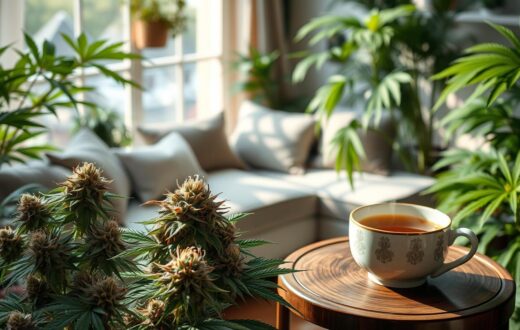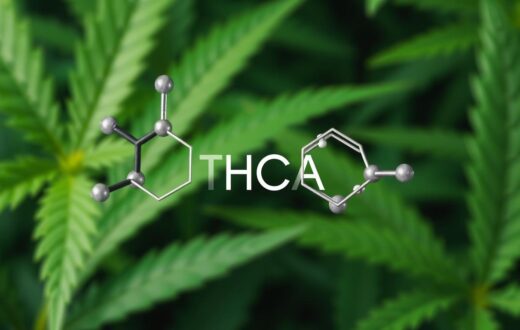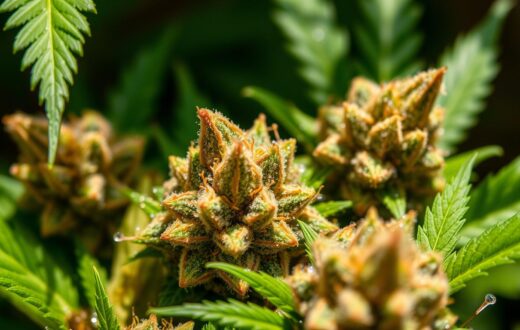Ever wondered why raw cannabis doesn’t get you high? The answer is a compound called THCA. It’s a key player in cannabis’s potency and health benefits.
THCA, or tetrahydrocannabinolic acid, is found in fresh cannabis plants. It’s the precursor to THC, the psychoactive part of marijuana. But, THCA doesn’t get you high when you eat it raw.
Decarboxylation is the magic that happens. When cannabis is heated, smoked, or vaporized, THCA turns into THC. This change is crucial for understanding cannabis’s effects.
Research is showing THCA might have health benefits. A study on mice found it could protect the brain and improve thinking. These results suggest exciting possibilities for future research.
As we learn more about THCA, we’re discovering new things about cannabis. It’s changing how we see the plant’s chemistry and its benefits. Let’s dive into the world of THCA and its role in cannabis.
What is THCA?
THCA, or tetrahydrocannabinolic acid, is a key part of cannabis plants. It’s one of over 500 known cannabinoids and plays a crucial role in the plant’s chemistry. Fresh cannabis plants are rich in THCA, which is a precursor to the well-known compound THC.
Definition and Characteristics
THCA is a non-psychoactive compound found abundantly in raw cannabis. Unlike THC, it doesn’t produce the “high” associated with cannabis use. THCA has shown potential health benefits, including anti-inflammatory properties. It’s believed to inhibit certain enzymes in the body, which may contribute to its therapeutic effects.
Chemical Structure of THCA
The chemical structure of THCA is similar to THC, but with an important difference. THCA contains an extra carboxyl group, which is removed through a process called decarboxylation. This process typically occurs when cannabis is heated, such as during smoking or cooking. Cannabis enthusiasts often recommend heating material at 230-250 degrees Fahrenheit for 30-40 minutes for effective decarboxylation.
Differences Between THCA and THC
The main difference between THCA and THC lies in their effects on the body. THC is psychoactive, causing changes in perception and pain sensation. THCA, on the other hand, is non-psychoactive. The legal status of these compounds also differs. While THC is federally illegal in the United States, THCA derived from hemp is legal under the 2018 Farm Bill if it contains less than 0.3% THC. Both compounds are being studied for their potential therapeutic effects, with ongoing cannabis testing to better understand their properties.
How is THCA Produced in Cannabis?
THCA is a key part of cannabis plants. It starts forming when seeds germinate, which takes about a week. The plant needs lots of light, nutrients, and water to grow.
When the plant flowers, THCA production really increases.
Natural Formation in the Plant
Genetics are important for high THCA levels. Growing conditions like temperature and soil pH affect it. Organic growing can lead to better THCA flowers.
Role of Decarboxylation
When cannabis is heated, THCA turns into THC. To keep THCA, it’s important to store it properly. Trimming carefully during harvest helps avoid damaging trichomes.
Drying and curing are key to keep THCA from turning into THC. Hemp laws often focus on THC, not THCA. This creates a legal grey area for THCA products.
Benefits of THCA in Cannabis
THCA is a key part of medical marijuana, even though it doesn’t get you high. It’s found in raw cannabis and has healing powers. Let’s look at what makes THCA special and the research that’s happening.
Therapeutic Properties
THCA might help with inflammation, which could be good for arthritis. It could also help with nausea, especially for those going through chemotherapy. Some studies say THCA might be better at reducing nausea than THC, even at lower doses.
It’s also being looked at for treating epilepsy. This makes THCA very interesting for medical use.
Research on Healing Potential
Scientists are studying THCA’s healing powers. They think it might protect the brain from diseases like Parkinson’s or Alzheimer’s. It also has antioxidant properties, which could protect cells from harm.
Even though research is still in its early stages, THCA is attractive because it doesn’t get you high. This makes it a good option for those looking for relief without the psychoactive effects.
Cannabis terpenes work with THCA to make it even more effective. This shows how important it is to use the whole plant to get the most benefits. As more research is done, THCA could become a key part of medical marijuana, offering a natural solution for many health issues.
THCA vs. THC: Key Differences
THCA and THC are two main cannabinoids found in cannabis plants. They have similarities but also big differences. Knowing these differences helps us understand cannabis potency and hemp laws.
Psychoactive Effects
THCA is the most common non-psychoactive cannabinoid in cannabis. It doesn’t cause a high because of its molecular structure. THC, on the other hand, is known for its intoxicating effects.
When THCA is heated, it turns into THC. This change unlocks its psychoactive potential. This is why THCA doesn’t get you high on its own.
Legal Status and Regulations
Hemp laws differ for THCA and THC. The 2018 Farm Bill makes hemp products with less than 0.3% THC legal. But, THCA’s legal status is not as clear and varies by state.
THCA can turn into THC, which is still a Schedule I substance federally. Hemp-derived THC is legal under certain conditions. THCA is in a legal gray area but might be seen as THC’s analog in some places.
Cannabis potency is often measured by THCA before it’s activated. Strains with 15% or more THCA are very potent. Labs use Gas Chromatography and Liquid Chromatography to test THCA and THC levels.
These differences in effects and laws make THCA and THC unique in the cannabis world.
The Role of THCA in Medical Cannabis
THCA is key in medical marijuana. It’s a non-psychoactive compound in raw cannabis plants. Doctors are looking into its benefits for patients.
Use in Patient Treatment Plans
Doctors are seeing the value of THCA in treatments. Some patients use it for chronic pain, inflammation, and nausea. It doesn’t cause a “high,” making it good for those who want relief without psychoactive effects.
Case Studies and Research Findings
Recent studies show THCA’s potential. A 2017 study found it protects the brain. Other research shows it fights inflammation. These findings are leading to more research on how it works in the body.
While early results are promising, more human trials are needed. As research goes on, THCA could play a big role in medical treatments.
How to Consume THCA
THCA offers unique benefits for cannabis lovers. It comes in different forms, each with its own way to use it. Let’s look at how you can add THCA to your daily routine.
Raw Cannabis Consumption
Enjoying THCA through raw cannabis is a great option. Fresh leaves and buds have lots of THCA. Some people add these to smoothies or salads.
This method keeps THCA in its natural state. Cannabis testing confirms that raw consumption preserves it well.
THCA Oils and Tinctures
THCA oils and tinctures are another choice. They make it easy to control how much you take. They’re perfect for those who don’t want to smoke.
Some tinctures have almost 100% THCA. This shows their high quality. You can take drops under your tongue or mix them into drinks.
THCA crystals are also becoming popular. They can be over 90% pure. Users often dab these crystals for quick effects.
But remember, heat above 280°F can turn THCA into THC. For those looking for wellness without the high, trying raw THCA crystals might be a good option.
Whichever way you choose, start with a small amount. THCA products can be strong. It’s best to start slow. Always buy from trusted sources for quality and safety. With these options, you can find the best way to include THCA in your cannabis journey.
The Importance of THCA for CBD Products
THCA is key in CBD products, making them more effective and beneficial for health. This non-psychoactive compound pairs well with CBD, creating a strong combo for medical marijuana users. Let’s look at how THCA and CBD work together to offer health benefits.
Synergy Between THCA and CBD
THCA and CBD activate cannabinoid receptors in the body together. This teamwork makes cannabis treatments more effective. They may also have stronger anti-inflammatory and neuroprotective effects than alone. This partnership is vital in whole-plant medicine.
Potential Health Benefits
THCA and CBD in medical marijuana show promise for many health issues. Research indicates they may help with arthritis, inflammatory bowel disease, and nausea. THCA’s antioxidant properties and CBD’s calming effects make a powerful mix for wellness.
As interest in cannabis treatments grows, knowing THCA’s role in CBD products is more important. Using both compounds can lead to better health outcomes. It’s important to talk to healthcare providers to find the right mix for individual needs.
Legal Implications of THCA
The legal world of THCA is complex and keeps changing. Hemp laws are key in figuring out if THCA products are legal. The 2018 Farm Bill made hemp legal, allowing products with 0.3% THC or less.
State vs. Federal Regulations
Even though federal law says THCA from hemp is okay, state laws can be different. This creates confusion in places where marijuana is still illegal. The DEA sees tetrahydrocannabinols, including THCA, as Schedule I substances. But, hemp with no more than 0.3% THC is not controlled by the CSA.
Impacts on Cannabis Legislation
THCA products in places where weed is illegal have led to talks about changing laws. The House Committee on Agriculture wants to ban intoxicating hemp products, including THCA. Testing cannabis is getting more important to make sure it follows hemp laws. Now, some THCA products have Certificates of Analysis (COAs), like legal weed.
As the cannabis world grows, lawmakers must find a balance. The DEA is looking into changing cannabis’s status from Schedule I to Schedule III. This could make it easier to use cannabis for adults and affect THCA’s legal status nationwide.
Cultivation Practices for High THCA Levels
Growers are always on the hunt for ways to increase cannabis potency. The secret lies in understanding how cannabinoids are made and how it impacts THCA production. Let’s dive into some methods that can help growers get more THCA in their plants.
Breeding Techniques
Choosing the right strains is essential for high THCA content. Strains like Gelato Cake, Runtz, and White Rainbow are known for their THCA levels. When breeding, pick strains that naturally have more THCA.
Remember, other factors like how long it takes to flower and resistance to diseases matter too. This focus helps grow plants with better cannabinoid production.
Optimal Growing Conditions
Creating the perfect environment is crucial for high THCA levels. Light is a big factor in making cannabinoids. Give plants 18-24 hours of light a day during the vegetative stage.
Keep humidity at 40-50% during flowering to boost resin. And, keep drying temperatures between 60-70°F. These conditions help with the best cannabinoid production and keep the cannabis potent.
Proper nutrient management is key throughout growing. Use stress techniques like low-stress training to increase resin. Harvest when trichomes turn from clear to cloudy for peak THCA levels.
Remember, growing high-THCA cannabis needs attention to detail at every step, from seed to curing.
Potential Side Effects of THCA
THCA is found in raw cannabis plants and is generally safe. However, users should know about possible side effects. Medical marijuana users and those getting cannabis tested should be aware of these effects for safe use.
Common Reactions
THCA can make you feel drowsy, dry your mouth, and change your appetite. It might also affect your blood pressure. Long-term use could impact your memory and focus.
These effects are usually mild because THCA doesn’t bind well with brain receptors. This is different from THC.
What to Watch Out For
Smoking THCA can harm your lungs. Vaping or eating it is safer. Regular use might make you dependent on it.
People with health issues, pregnant women, and teens might react differently to THCA. Taking too much could make you anxious or sleepy. It’s key to buy THCA products from trusted brands to avoid harmful substances.
THCA might help reduce inflammation and nausea, and even protect your brain. But, when heated, it turns into THC, which could make effects stronger. Always talk to a doctor before using THCA products, especially if you’re on other medicines.
THCA and the Entourage Effect
The entourage effect in cannabis shows how different plant compounds work together. This teamwork includes cannabinoids and terpenes, which boost the plant’s benefits. THCA, a non-psychoactive THC precursor, is crucial in this synergy.
Understanding Cannabinoid Interaction
Cannabinoid receptors in our bodies react to various cannabis compounds. Studies reveal that full-spectrum extracts, with many cannabinoids like THC and CBD, have stronger effects. This teamwork can lead to better pain relief and improved health outcomes.
Importance in Whole-Plant Medicine
Whole-plant medicine values keeping THCA and other compounds together. A 2018 study showed that a CBD-rich cannabis extract was better at reducing seizures than pure CBD. This supports the entourage effect’s role in cannabis’s therapeutic power.
Combining different cannabis compounds can also reduce side effects. For instance, CBD might lessen THC’s negative effects on the mind. This balance makes cannabis safer for new users and more effective for medical use.
Current Research Trends on THCA
THCA, the precursor to THC found in raw cannabis flowers, is getting more attention in medical marijuana research. Scientists are looking into its potential uses. They are studying its anti-inflammatory effects and how it works with the endocannabinoid system.
Ongoing Studies
Research shows THCA might protect the brain and fight cancer cells. It’s also being studied for its effects on nausea and appetite. A 2024 study in the Journal of Cannabis Research looked at Hemp Cheungsam, a hybrid with low THCA. This study helps us understand how THCA is made and what affects its production.
Future Directions in Research
Future studies will aim to improve THCA production in cannabis plants. Researchers are using advanced methods like RNA sequencing to learn more about how cannabinoids are made. This could lead to new strains with the right amount of THCA. Also, more research will look into THCA as a non-psychoactive option for medical use.
Consumer Awareness and Education on THCA
THCA products are becoming more popular, and it’s important to know what they are. THCA flower has less than 0.3% delta-9 THC, which makes it legal under hemp rules. This legal status lets people buy it online, even in states with strict cannabis laws.
Importance of Informed Consumption
It’s key to know the difference between THCA and THC for safe use. THCA doesn’t get you high, as it’s under the federal limit of 0.3%. Testing cannabis ensures it’s pure and strong. A 2022 survey showed 30% of medical cannabis users like THCA-rich strains, showing its growing popularity.
Resources for Learning More
To stay informed, check out trusted cannabis education sites and scientific journals. Social media is also a good source. Instagram has cool posts about THCA, and LinkedIn has detailed articles. These sources explain THCA’s health benefits, like reducing inflammation and protecting the brain.
As the THCA market grows, with prices from $55 to $99, staying educated is crucial. Experts say the market will keep growing, with more companies making THCA products. By learning about hemp laws and following reliable sources, you can make smart choices about using THCA.
Myths and Misconceptions about THCA
THCA is a key compound in cannabis that often causes confusion. Let’s clear up some common misunderstandings about this fascinating cannabinoid.
Debunking Common Myths
Many think THCA makes you high like THC. But, THCA is non-intoxicating in its raw form. It only becomes psychoactive when heated, turning into THC through decarboxylation.
Clarifying Misunderstandings
Some believe all THCA products are legal everywhere. But, this isn’t true due to different state laws. For example, California allows THCA from both hemp and marijuana, while Texas has stricter rules.
Others think THCA has no medicinal value. But, research shows it might have anti-inflammatory, neuroprotective, and anti-emetic properties. These benefits make it a promising area for medical marijuana research.
The Future of THCA in Cannabis Industry
The THCA market is growing fast in the cannabis world. In 2023, THCA sales were 7.3% of the $2.8 billion hemp product market. This shows a bright future for THCA.
Market Trends
Hemp laws are key in the THCA market. Some states let THCA flower sales as long as THC levels are under 0.3%. This has boosted THCA product sales in places like North Carolina and Texas.
Predictions for Growth
THCA’s future looks good, but there are challenges. New tests are being made to check for THCA. The DEA’s views on THCA and possible Farm Bill changes could affect the market.
Despite these issues, more people are learning about THCA’s benefits. This could lead to more products and better ways to make them. The industry’s growth will depend on more research and changes in laws and what people want.
Conclusion: Understanding the Role of THCA
THCA in cannabis is key to the plant’s chemistry and its medical uses. We’ve seen how THCA is the non-psychoactive form of THC. It offers benefits without the “high” from traditional cannabis use.
Summary of Benefits and Uses
Studies show THCA might help with inflammation, protect the brain, and reduce nausea. These traits make it great for treating arthritis, inflammatory bowel disease, and neurodegenerative diseases. Unlike THC, THCA doesn’t cause anxiety or affect coordination, offering therapeutic benefits without the psychoactive side effects.
Final Thoughts on THCA in Cannabis
As the cannabis industry grows, THCA is becoming more popular in both medical and recreational markets. Research on THCA’s benefits is promising, but more studies are needed. For those looking for cannabis benefits without the psychoactive effects, THCA is an interesting choice. As we learn more about cannabis compounds, THCA’s role in cannabis use and research will likely grow.
